RD Sharma class 10 solutions Chapter 8 Quadratic Equations Ex 8.6
RD Sharma Class 10 Solutions Quadratic Equations Exercise 8.6
Question 1.
Determine the nature of the roots of following quadratic equations :
(i) 2x² – 3x + 5 = 0 [NCERT]
(ii) 2x² – 6x + 3 = 0 [NCERT]
(iii) \(\frac { 3 }{ 5 }\) x² – \(\frac { 2 }{ 3 }\) x + 1 = 0
(iv) 3x² – 4√3 x + 4 = 0 [NCERT]
(v) 3x² – 2√6 x + 2 = 0
Solution:


Question 2.
Find the values of k for which the roots are real and equal in each of the following equations :
(i) kx² + 4x + 1 = 0
(ii) kx² – 2√5 x + 4 = 0
(iii) 3x² – 5x + 2k = 0
(iv) 4x²+ kx + 9 = 0
(v) 2kx² – 40x + 25 = 0
(vi) 9x² – 24x + k = 0
(vii) 4x² – 3kx +1 = 0
(viii) x² – 2 (5 + 2k) x + 3 (7 + 10k) = 0
(ix) (3k + 1) x² + 2(k + 1) x + k = 0
(x) kx² + kx + 1 = – 4x² – x
(xi) (k + 1) x² + 2 (k + 3) x + (k + 8) = 0
(xii) x² – 2kx + 7k – 12 = 0
(xiii) (k + 1) x² – 2 (3k + 1) x + 8k + 1 = 0
(xiv) 5x² – 4x + 2 + k (4x² – 2x – 1) = 0
(xv) (4 – k) x² + (2k + 4) x (8k + 1) = 0
(xvi) (2k + 1) x² + 2 (k + 3) x (k + 5) = 0
(xvii) 4x² – 2 (k + 1) x + (k + 4) = 0
(xviii) 4x² (k + 1) x + (k + 1) = 0
Solution:














Question 3.
In the following, determine the set of values of k for which the given quadratic equation has real roots :
(i) 2x² + 3x + k = 0
(ii) 2x² + x + k = 0
(iii) 2x² – 5x – k = 0
(iv) kx² + 6x + 1 = 0
(v) 3x² + 2x + k = 0
Solution:



Question 4.
Find the values of k for which the following equations have real and equal roots :
(i) x²- 2(k + 1) x + k² = 0 [CBSE 2001C, 2013]
(ii) k²x² – 2 (2k – 1) x + 4 = 0 [CBSE 2001C]
(iii) (k + 1) x² – 2(k – 1) x + 1 = 0 [CBSE 2002C]
(iv) x² + k(2x + k – 1) + 2 = 0 [CBSE 2017]
Solution:



Question 5.
Find the values of k for which the following equations have real roots
(i) 2x² + kx + 3 = 0 [NCERT]
(ii) kx (x – 2) + 6 = 0 [NCERT]
(iii) x² – 4kx + k = 0 [CBSE 2012]
(iv) kx(x – 2√5 ) + 10 = 0 [CBSE 2013]
(v) kx (x – 3) + 9 = 0 [CBSE 2014]
(vi) 4x² + kx + 3 = 0 [CBSE 2014]
Solution:
(i) 2x² + kx + 3 = 0
Here a = 2, b = k, c = 3



Question 6.
Find the values of k for which the given quadratic equation has real and distinct roots :
(i) kx² + 2x + 1 = 0
(ii) kx² + 6x + 1 = 0
Solution:

Question 7.
For what value of k, (4 – k) x² + (2k + 4) x + (8k + 1) = 0, is a perfect square.
Solution:
(4 – k) x² + (2k + 4) x + (8k + 1) = 0
Here, a = 4 – k, b = 2k + 4, c = 8k + 1

Question 8.
Find the least positive value of k for which the equation x² + kx + 4 = 0 has real roots.
Solution:

Question 9.
Find the value of k for which the quadratic equation (3k + 1) x² + 2(k + 1) x + 1 = 0 has equal roots. Also, find the roots.
[CBSE 2014]
Solution:


Question 10.
Find the values of p for which the quadratic equation (2p + 1) x² – (7p + 2) x + (7p – 3) = 0 has equal roots. Also, find these roots.
Solution:


Question 11.
If – 5 is a root of the quadratic equation 2x² + px – 15 = 0 and the quadratic equation p(x² + x) + k = 0 has equal-roots, find the value of k. [CBSE 2014]
Solution:


Question 12.
If 2 is a root of the quadratic equation 3x² + px – 8 = 0 and the quadratic equation 4x² – 2px + k = 0 has equal roots, find the value of k. [CBSE 2014]
Solution:

=> 16k = 16
k = 16
Question 13.
If 1 is a root of the quadratic equation 3x² + ax – 2 = 0 and the quadratic equation a(x² + 6x) – b=0 has equal roots, find the value of b.
Solution:

Question 14.
Find the value of p for which the quadratic equation (p + 1) x² – 6 (p + 1) x + 3 (p + q) = 0, p ≠ -1 has equal roots. Hence, find the roots of the equation. [CBSE 2015]
Solution:


Question 15.
Determine the nature of the roots of following quadratic equations :
(i) (x – 2a) (x – 2b) = 4ab
(ii) 9a²b²x² – 24abcdx + 16c²d² = 0, a ≠ 0, b ≠ 0
(iii) 2 (a² + b²) x² + 2 (a + b) x + 1 = 0
(iv) (b + c) x² – (a + b + c) x + a = 0
Solution:


Question 16.
Determine the set of values of k for which the given following quadratic equation has real roots :
(i) x² – kx + 9 = 0
(ii) 2x² + kx + 2 = 0
(iii) 4x² – 3kx +1=0
(iv) 2x² + kx – 4 = 0
Solution:


Question 17.
If the roots of the equation (b – c) x² + (c – a) x + (a – b) = 0 are equal, then prove that 2b = a + c. [CBSE 2002C]
Solution:

=> a + c = 2b
=> 2b = a + c
Hence proved.
Question 18.
If the roots of the equation (a² + b²) x² – 2 (ac + bd) x + (c² + d²) = 0 are equal. prove that \(\frac { a }{ b }\) = \(\frac { c }{ d }\)
Solution:

Question 19.
If the roots of the equations ax² + 2bx + c = 0 and bx² – 2√ac x + b = 0 are simultaneously real, then prove that b² = ac
Solution:


Question 20.
If p, q are real and p ≠ q, then show that the roots of the equation (p – q) x² + 5(p + q) x – 2(p – q) = 0 are real and unequal.
Solution:

Question 21.
If the roots of the equation (c² – ab) x² – 2 (a² – bc) x + b² – ac = 0 are equal, prove that either a = 0 or a
3
+ b
3
+ c
3
= 3abc.
Solution:

Question 22.
Show that the equation 2 (a² + b²) x² + 2 (a + b) x + 1 = 0 has no real roots, when a ≠ b.
Solution:

Question 23.
Prove that both the roots of the equation (x – a) (x – b) + (x – b) (x – c) + (x – c) (x – a) = 0 are real but they are equal only when a = b = c.
Solution:

Question 24.
If a, b, c are real numbers such that ac ≠ 0, then show that at least one of the equations ax² + bx + c = 0 and – ax² + bx + c = 0 has real roots.
Solution:

Question 25.
If the equation (1 + m²) x² + 2mcx + (c² – a²) = 0 has equal roots, prove that c² = a² (1 + m²). (C.B.S.E. 1999)
Solution:

Exercise 8.6
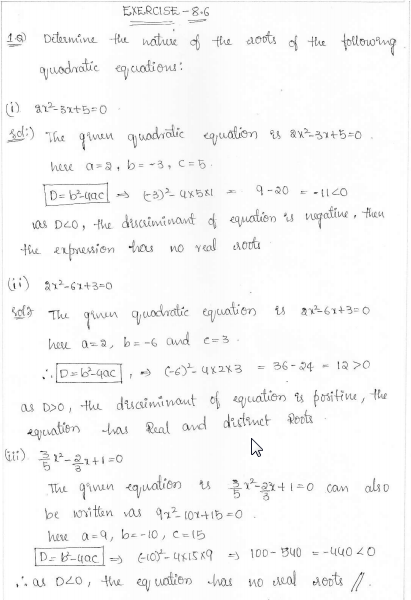
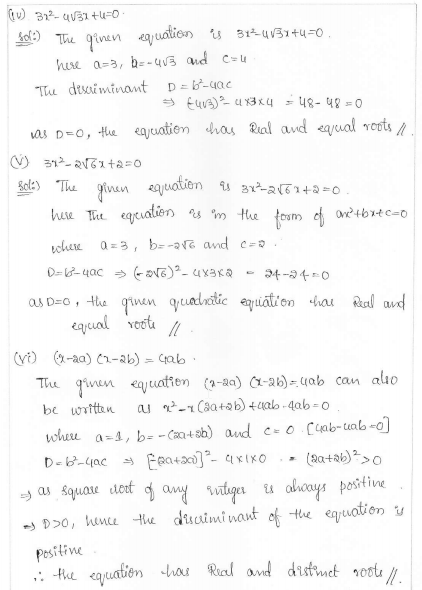
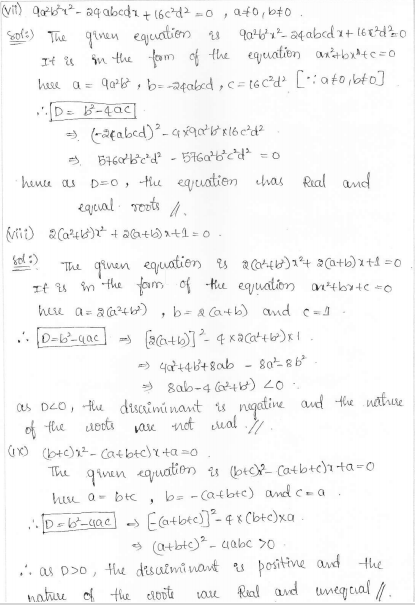
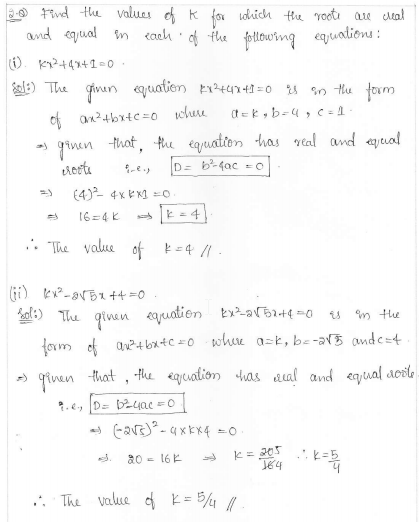
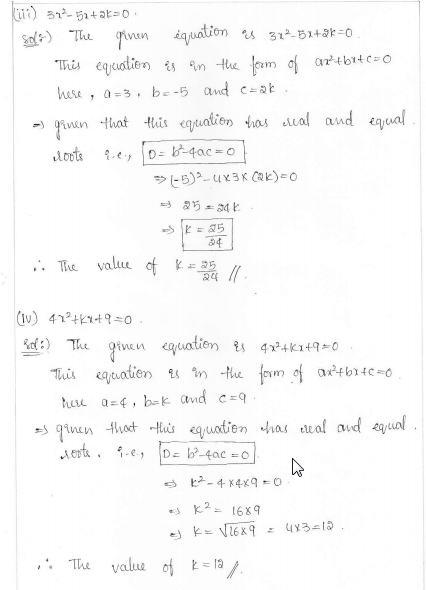
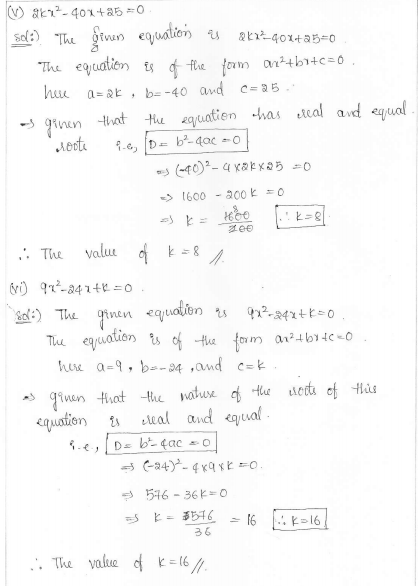
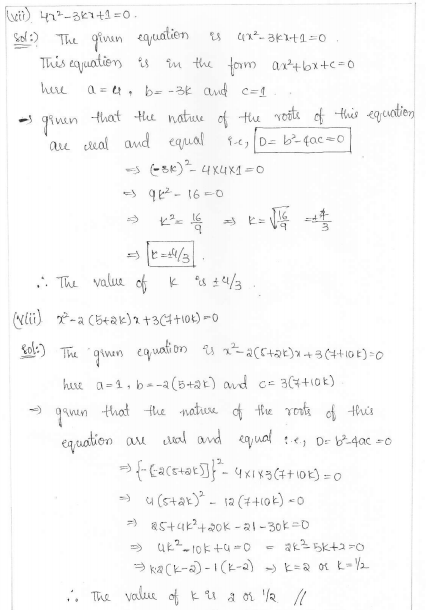
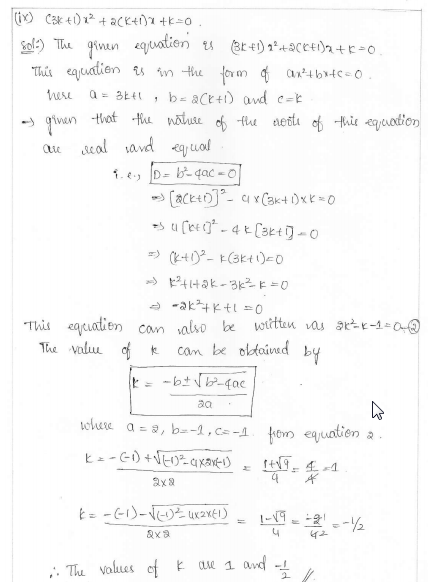
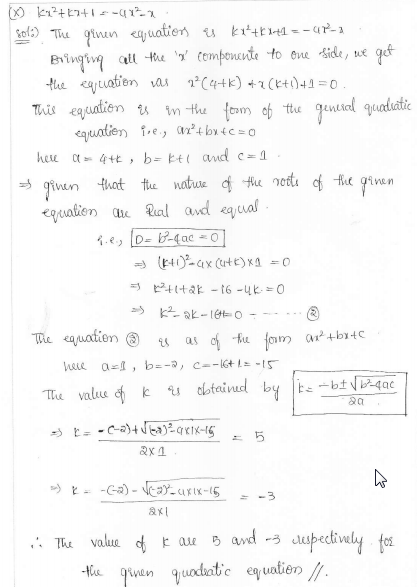
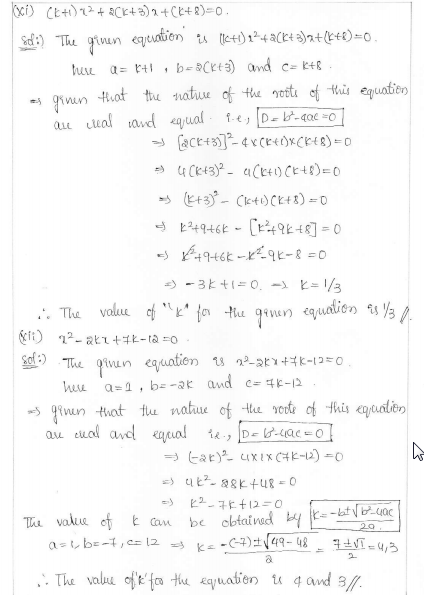
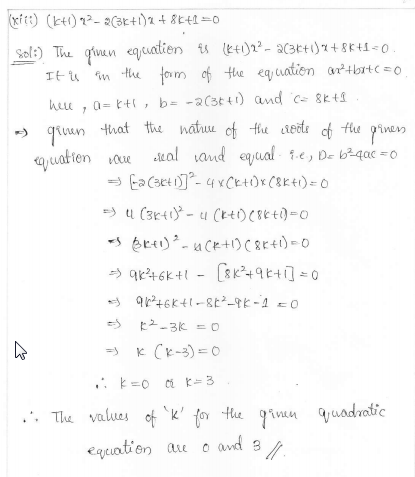
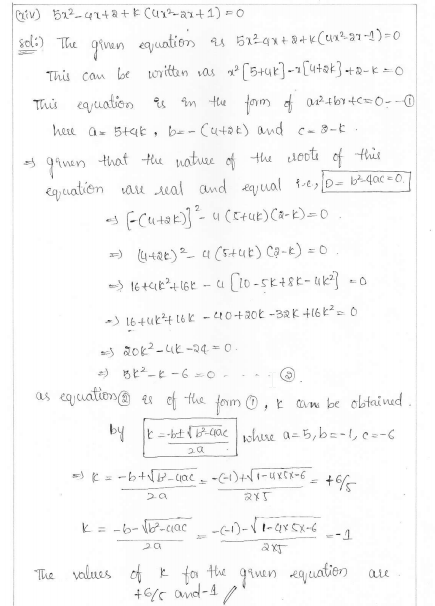
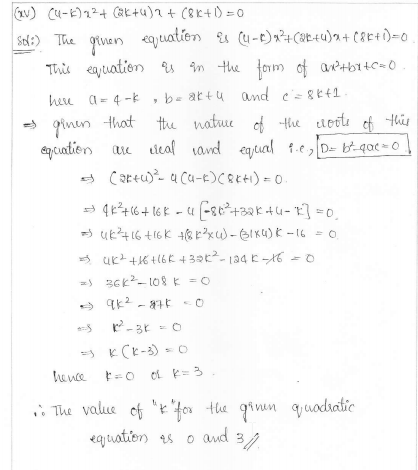
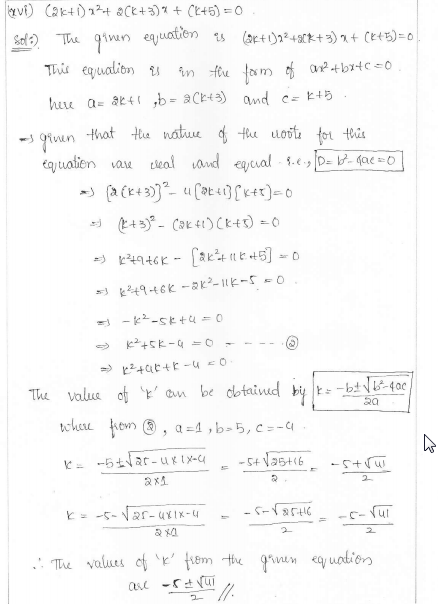
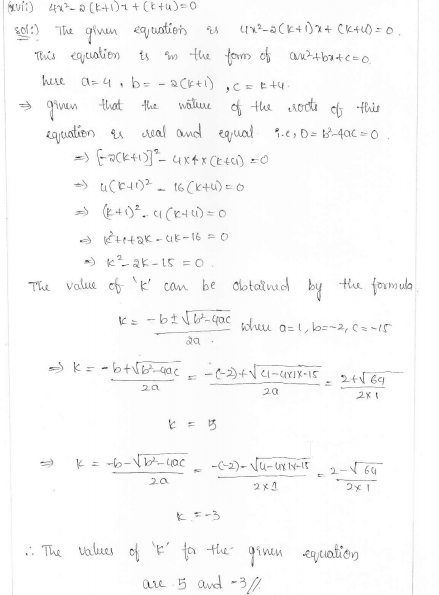
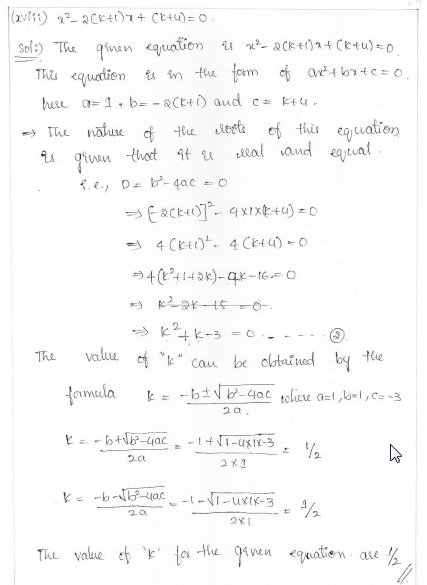
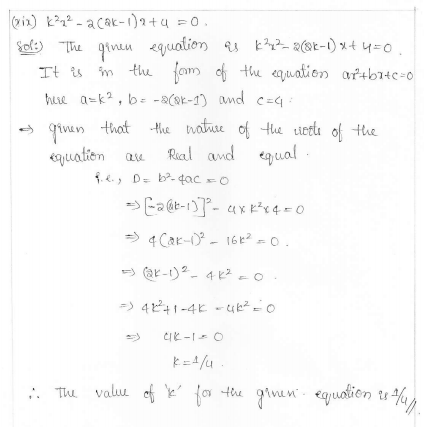
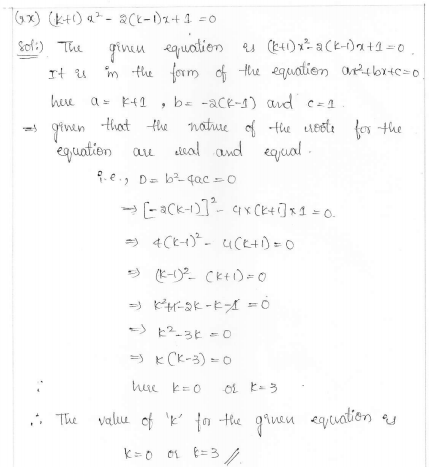
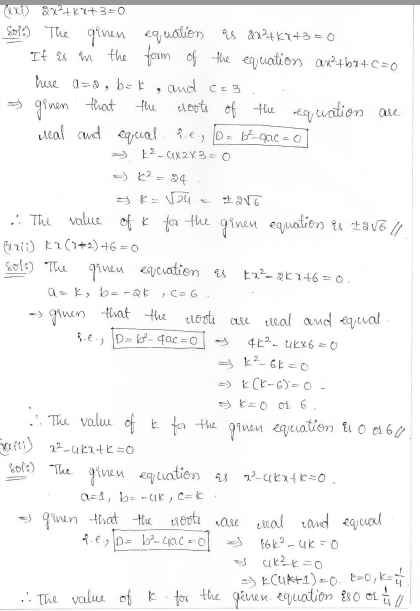
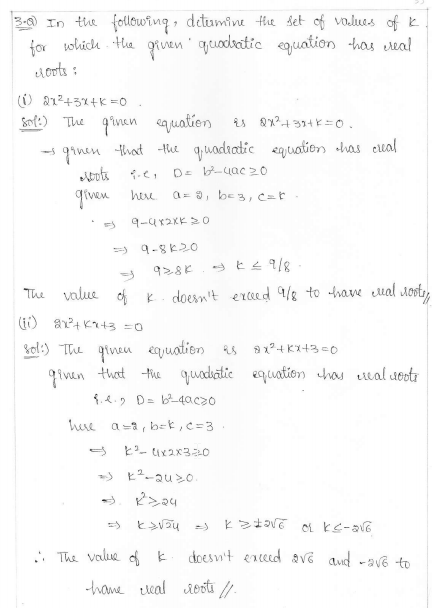
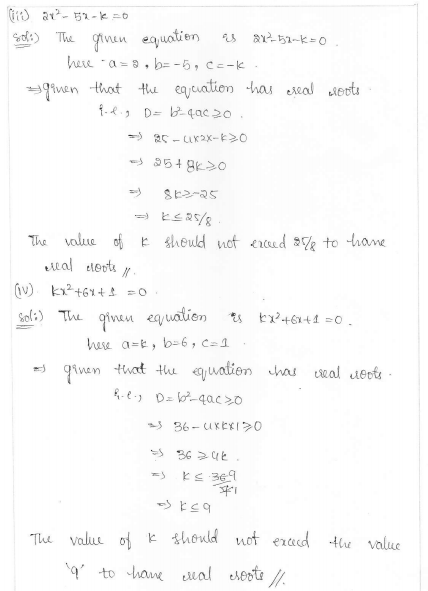
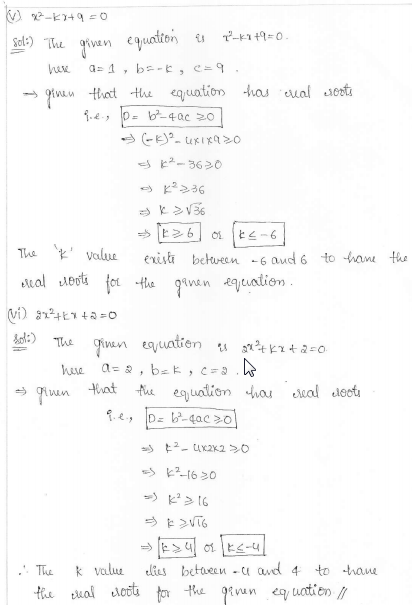
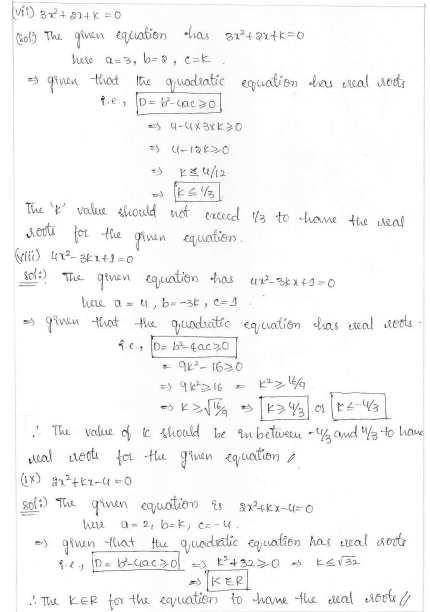
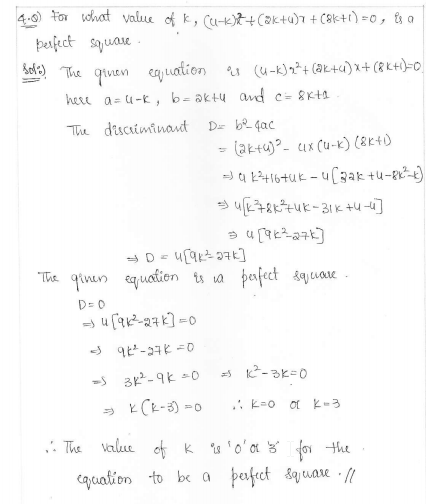
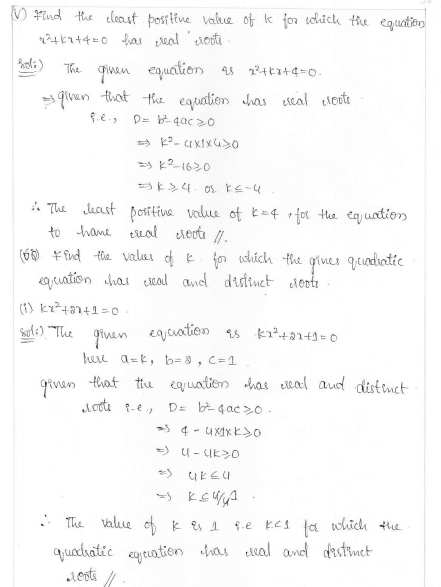
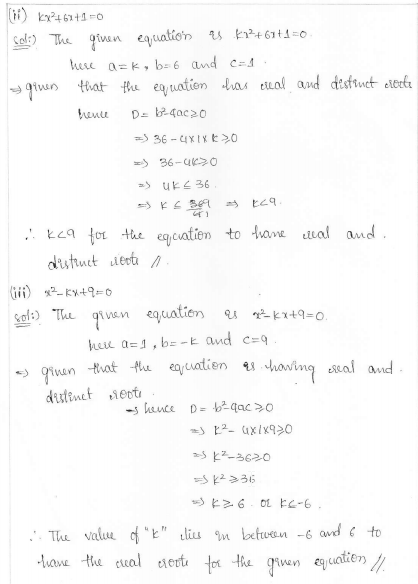
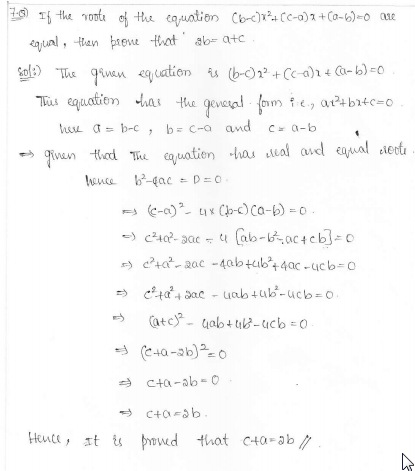
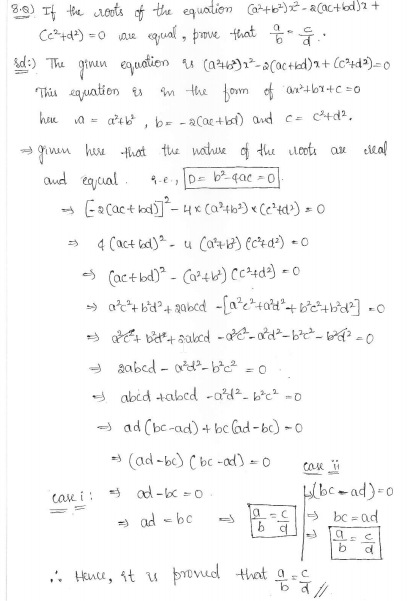
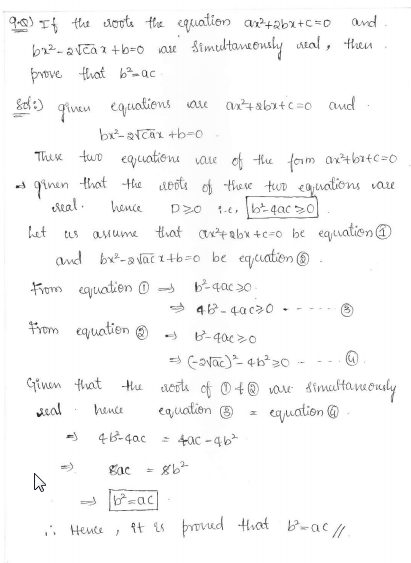

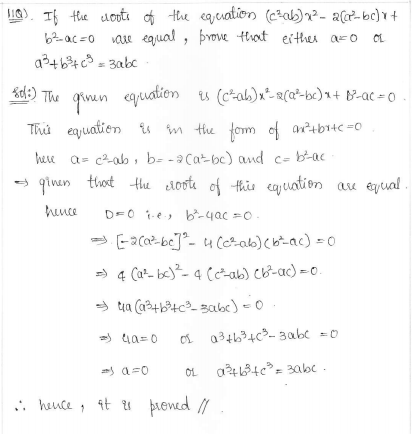
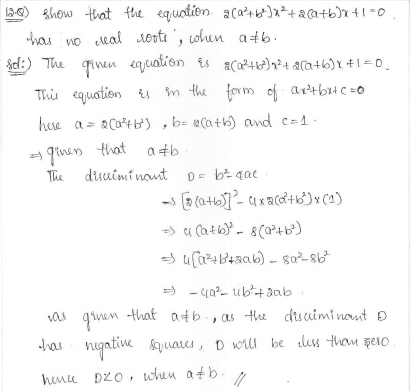
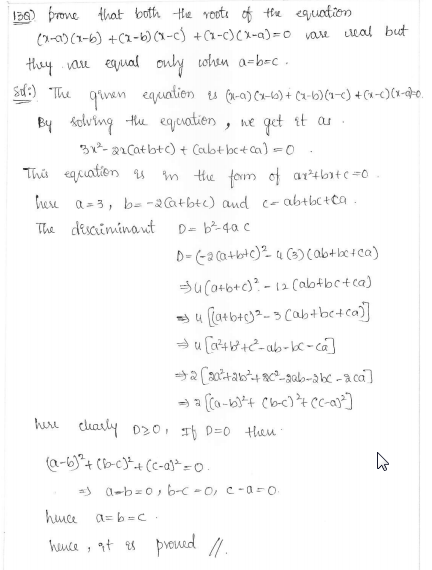
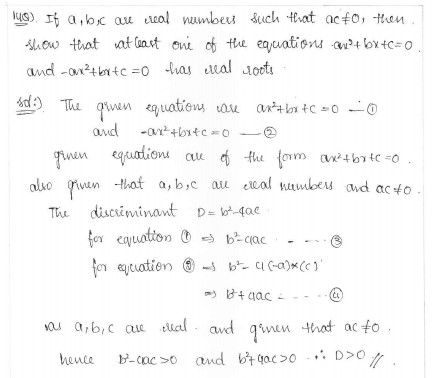
RD Sharma Class 10 Solutions
- Chapter 8 Quadratic Equations Ex 8.1
- Chapter 8 Quadratic Equations Ex 8.2
- Chapter 8 Quadratic Equations Ex 8.3
- Chapter 8 Quadratic Equations Ex 8.4
- Chapter 8 Quadratic Equations Ex 8.5
- Chapter 8 Quadratic Equations Ex 8.6
- Chapter 8 Quadratic Equations Ex 8.7
- Chapter 8 Quadratic Equations Ex 8.8
- Chapter 8 Quadratic Equations Ex 8.9
- Chapter 8 Quadratic Equations Ex 8.10
- Chapter 8 Quadratic Equations Ex 8.11
- Chapter 8 Quadratic Equations Ex 8.12
- Chapter 8 Quadratic Equations Ex 8.13